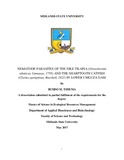Please use this identifier to cite or link to this item:
https://cris.library.msu.ac.zw//handle/11408/3046| Title: | Nematode parasites of the nile tilapia (Oreochromis niloticus, Linnaeus, 1758) and the sharptooth catfish (Clarias gariepinus, Burchell, 1822) in lower Umguza dam | Authors: | Tshuma, Busiso M. | Keywords: | Nematode parasites | Issue Date: | 2017 | Publisher: | Midlands State University | Abstract: | The study sought to determine abundance and species of nematode parasites of Oreochromis tilapicus and Clarias gariepinus in Lower Umguza Dam,in the Gwayi catchment area. Fish samples were collected from fishermen and sent to the laboratory for observation and identification using standard parasitological methods and identification guides. 479 nematode parasites were recovered from 160 fish belonging to 2 species; Oreochromis tilapicus and Clarias gariepinus. Four nematode genera; Paracamallunus sp., Eustrongylides sp., Contracaecum sp., and some unidentified nematodes parasites were recovered. Of the 160 host fish samples collected, 78.1% had nematode infections. 43.8% of the nematode parasites recovered were from Nile tilapia and 56.2% from Sharp-tooth catfish. Parasite abundances differed significantly (P<0.05) between the different nematode genera recovered from both Oreochromis tilapicus and Clarias gariepinus. The most abundant nematodes were Paracamallunus sp. (48.6%). Eustrongylides sp. and Paracamallunus sp. contributed 18% and 33% respectively. Unidentified parasites constituted 0.4% of the total number of nematode parasites collected. The results revealed a positive correlation (r = 0.681) between fish size and nematode parasite loads. Nematode parasites between the two host species were significant (P<0.05). Parasite abundances between the different sampling sites were not statistically significant (P>0.05). The results of the study indicated that the general abundances and levels of infestation were low in Lower Umguza Dam and this could be attributed to the above normal rainfall that was received between December 2016 and February 2017. Further studies on comprehensive fish parasite groups are recommended as the study only looked at nematode parasites. | URI: | http://hdl.handle.net/11408/3046 |
| Appears in Collections: | Master of Science in Ecological Resources Management |
Files in This Item:
| File | Description | Size | Format | |
|---|---|---|---|---|
| MSc Thesis Mandla-1.pdf | Full Text | 1.05 MB | Adobe PDF |  View/Open |
Page view(s)
128
checked on Feb 26, 2025
Download(s)
124
checked on Feb 26, 2025
Google ScholarTM
Check
Items in MSUIR are protected by copyright, with all rights reserved, unless otherwise indicated.


